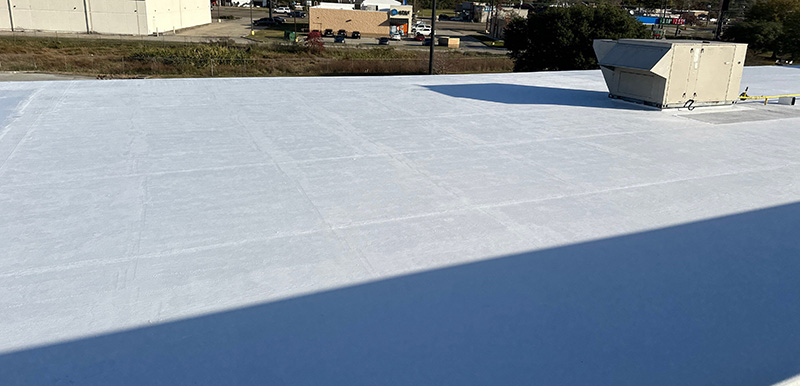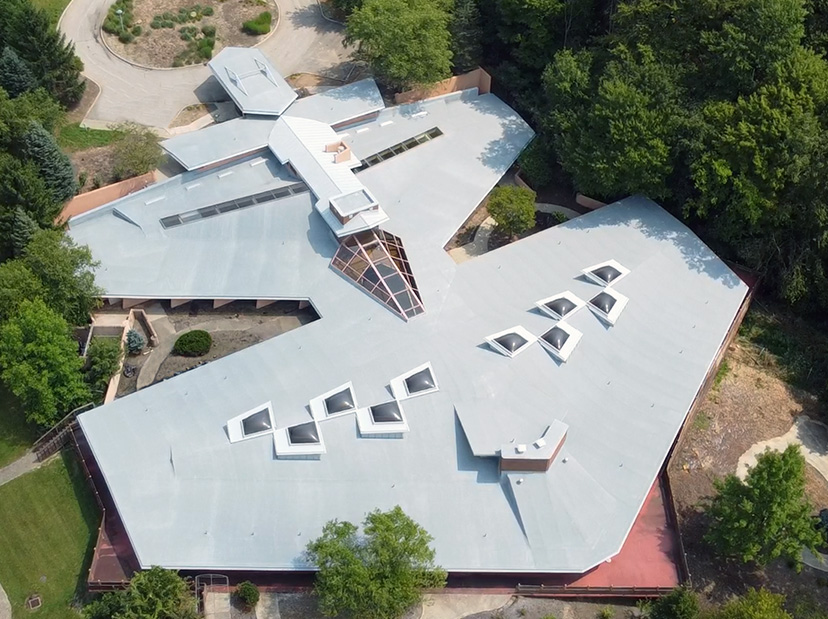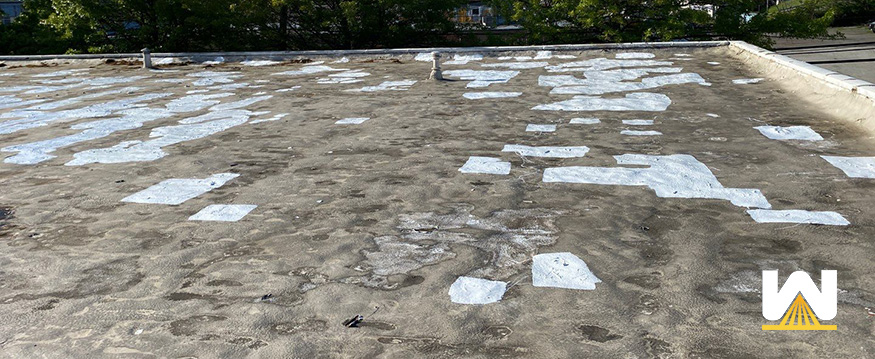So, your roof has been leaking for a while. You’re sick of the minor repairs and band-aids that only work for so long.
Now it’s time to get a quote to fix the entire roof.
Unfortunately, you don’t have a neighbor, brother-in-law, or someone you went to High School with who does commercial roofing.
Your only option is to collect quotes from unknown sources.
The #1 biggest mistake that can be made is to choose an untrustworthy contractor. Unfortunately, there are lots of bad contractors out there.
- Some contractors won’t put the proper thickness (or type of materials) down.
- Some will suggest a complete tear-off when it’s unnecessary.
These things happen all the time. This article is to help you avoid that.
In this article, you’ll learn 9 red flags that contractors can have. Hopefully after reading this, you’ll have some confidence in choosing a good contractor for your project.
The 9 “red flags” commercial contractors can have
- Don’t specify the type/brand of product they are going to install
- Don’t include a warranty or choose a very short warranty period
- Don’t describe safety setup
- Don’t include potential deck or insulation removal and replacement costs
- They don’t tell you the thickness of the product being installed
- They don’t include any info about proper drainage
- No details about the warranty. Are they No Dollar Limit (NDL), Full-System (labor and materials), and/or NPR (non-pro-rated) warranties?
- Less than a 4.0-star rating on Google
- No specific references
Don’t specify the type/brand of product they are going to install
We’ve seen quotes stating the contractor will apply one coat of primer and three coats of sealer.
We’ve seen other quotes stating they will apply a primer base coat and a “final roof coatings.”
And another that stated, “apply 870 commercial roof coating – two coats”.
I had to Google “870 commercial roof coating” to see that it’s a Rust-Oleum product.
At least it’s a brand name. The first two coating quotes could be anything.
When getting quotes for your project, research the brand name of the materials being used to verify their legitimacy.
More importantly, ensure they are approved applicators of their product. Most manufacturers require contractors to have proper training. This includes proper roof preparation, proper material thickness levels to grant a certain warranty length, and whether the roof is a good or bad candidate for their materials.

Don’t include a warranty or choose a very short warranty period
I know it sounds crazy, but there are scopes of work out there with no warranty.
Some we’ve seen only have a two-year warranty. Verify that the contractor is certified to issue the desired warranty.
And the quotes we’ve seen have been 6 figures. It’s not like these were temporary repairs only meant to last a few years.
Make sure when you get a quote that it’s a minimum of 10 years. Anything else just seems a little suspect.
Don’t describe safety setup
Not having any details about safety setup is unprofessional.
- Are there any designated walkways for the crew?
- Are any areas going to be blocked off to ensure the safety of your employees?
We’ve seen some “suspect” quotes for roof coating system installations. A coating system involves applying a fluid-applied material that can be carried away by the wind onto undesirable assets, such as employee vehicles.
- Are cars going to be covered?
- Are there areas where employees should not park for the week?

Don’t include potential deck or insulation removal and replacement costs
No silicone roof coating system (or really any roofing system) should be installed over wet/damaged insulation or bad decking.
Why?
- Trapped water can freeze in the Winter and create an opening when it thaws in the Spring.
- Trapped water can also evaporate if it’s hot and create an opening through the membrane or cause blisters.
- Trapped water reduces the effectiveness of insulation, lowering its R-value.
Bad decking is a safety hazard.
If none of these are addressed….or even investigated before the installation, this is a red flag of an improper installation.
They don’t tell you the thickness of the product being installed
We’ve seen professional quotes stating something like: “there will be a 10-mil thickness of silicone coating basecoat, then another 10 mil thickness of silicone coating topcoat installed.”
Then we’ve seen quotes:
“870 commercial roof coating two coats”
“Apply 1 coat primer, finish with 3 coats sealer”
None of these tell me what the thickness of the product is. Material thickness greatly impacts performance. Also, thickness is what determines the length of warranty. If no thickness is measured, then there probably isn’t any meaningful warranty length. And the material is probably applied as thin as possible.

They don’t include any info about proper drainage
Industry standards require that no area of water should exceed 100 square feet at ½” deep after 24 hours of dry conditions.
Is the current roof meeting those conditions?
Perhaps extra drains, a thicker coating application in certain areas, or building the roof up in an area with insulation board is needed to fix drainage issues.
If there’s no wording of this or any evidence presented to the owner that there is proper drainage, you could be left with standing/ponding water on the very next rainfall after the installation.
No details about warranty. Are they No Dollar Limit (NDL), Full-System (labor and materials), and/or NPR (non-pro-rated)?
There’s a difference between a simple “2-year leak-free warranty” and the acronyms mentioned above.
A 2-year warranty (unless it’s a specialized project) is unheard of for commercial roofing projects.
Typical warranties that are 10-20-years come in many different coverages:
- NDL – Is there a dollar limit cap on warranty work? If there is, that looks a little shady.
- Full-System – Are only material costs covered and you’re on the hook for labor? Make sure you fully understand your warranty.
- NPR – Say you get a 10-year warranty. It’s year 5 and there’s a warranty claim. Are you on the hook for 50% of the repair…or are you not?

Terrible Google reviews and low star rating
When people have a bad experience working with a roofing contractor, they sometimes write a negative Google Review.
Since they don’t have to see the contractor face-to-face, it’s easy to sit behind a computer and say what you have to say.
Most Google Reviews are honest, and not some bots writing them overseas, but they do happen.
I would take negative reviews seriously. If a company has many of them, the complaints are probably real.
I would be highly skeptical of any company that had less than an average 4.0-star rating.
NOTE: Go through the reviews. If there are 1-star reviews with no comments, then it might not be accurate. But if multiple people leave detailed reviews, such as: roof leaked in 1 year and now they don’t answer the phone. Or workers were disrespectful and left all their garbage on the roof, then you may consider that to be true. The same can be said for 5-star reviews. Someone saying, “great job, highly recommend”, doesn’t carry the same weight as someone writing several paragraphs about how well communication was and how good the job turned out.
No specific references
Every legitimate commercial roofing contractor should have references. Probably filled with long-time clients or relatives who would never say a bad word about the company.
So how do we get more honest references?
The only way to do this is to contact multiple people who have had the same roof installed over the same substrate as you.
For example, you have a TPO roof that’s getting a silicone roof coating system. Great! Ask for 3 references where coating was installed over TPO.
Have a metal roof that’s getting a spray foam roofing system installed? Great! Ask for 3 of those.
And step it up a notch by getting these “specific” jobs close to your location. Maybe you can even walk a few of the roofs if they are nearby.
Conclusion
I hope at least one of these points helps you. The worst thing is to spend thousands of dollars on a commercial roof that is not installed correctly.
Here are some other articles you might find helpful:


